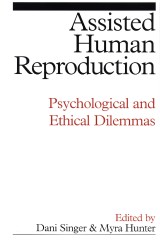Details

Assisted Human Reproduction
Psychological and Ethical Dilemmas1. Aufl.
|
61,99 € |
|
| Publisher: | Wiley |
| Format | |
| Published: | 22.02.2006 |
| ISBN/EAN: | 9780470032374 |
| Language: | englisch |
| Number of pages: | 220 |
DRM-protected eBook; you will need Adobe Digital Editions and an Adobe ID to read it.
Descriptions
With contributions from: Eric Blyth, Ken Daniels, Julia Feast, Robert Lee, Nina Martin, Alexina McWhinnie, Derek Morgan, Clare Murray, Sharon Pettle, Claire Potter, Jim Richards and Francoise Shenfield <p>The separation of procreation from conception has broadened notions of parenthood and created novel dilemmas. A woman may carry a foetus derived from gametes neither or only one of which came from her or her partner; or she may carry a foetus created using in vitro fertilisation (IVF) with the purpose of handing it to two other parents one, neither or both of whom may be genetically related to the prospective child. Parents may consist of single-sex couples, only one of them genetically related to the child; the prospective mother may be past her menopause; and genetic parenthood after death is now achievable. In a world increasingly reliant on medical science, how can the argument that equates traditional with natural and novel with unnatural/unethical be justified? Should there be legislation, which is notoriously slow to change, in a field driven by dazzling new possibilities at ever faster rate; particularly when restrictions differ from country to country, so that those who can afford it travel elsewhere for their treatment of choice? Whose rights are paramount - the adults hoping to build a family or the prospective child(ren)s future well being? On what basis can apparently competing rights be regulated or adjudicated and how and to what extent can these be enforced in practice?</p>
Contributors. <p>Foreword (Professor Susan Golombok).</p> <p>Introduction.</p> <p>Chapter 1: Assisted human reproduction: contemporary policy and practice in the UK (Eric Blyth, Nina Martin and Claire Potter).</p> <p>Chapter 2: Issues of gamete donation and sex selection: a clinician's view (Francoise Shenfield).</p> <p>Chapter 3: Ethical issues - the major faiths: a personal view (Jim Richards).</p> <p>Chapter 4: Human reproduction and human rights (Derek Morgan and Robert G. Lee).</p> <p>Chapter 5: Donor-assisted conception: what can we learn from adoption? (Julia Feast).</p> <p>Chapter 6: Children raised in assisted human reproduction families: the evidence (Clare Murray).</p> <p>Chapter 7: Disclosure and development: 'taking the bady home was just the beginning' (Alexina M. McWhinnie).</p> <p>Chapter 8: Psychological therapy and counselling with individuals and families afrter donor conception (Sharon A. Pettle).</p> <p>Chapter 9: Policy development in third party reproduction: an international perspective (Ken Daniels).</p> <p>Appendix: Resources.</p> <p>Index.</p>
<p><b>Dani Singer</b> is the editor of <i>Assisted Human Reproduction: Psychological and Ethical Dilemmas</i>, published by Wiley.</p> <p><b>Myra Sally Hunter</b> is Professor of Clinical Health Psychology at the Institute of Psychiatry, Psychology and Neuroscience, King's College, London, and a Clinical and Health Psychologist at the South London and Maudsley NHS Foundation Trust.</p>
With contributions from: Eric Blyth, Ken Daniels, Julia Feast, Robert Lee, Nina Martin, Alexina McWhinnie, Derek Morgan, Clare Murray, Sharon Pettle, Claire Potter, Jim Richards and Francoise Shenfield <p>The separation of procreation from conception has broadened notions of parenthood and created novel dilemmas. A woman may carry a foetus derived from gametes neither or only one of which came from her or her partner; or she may carry a foetus created using in vitro fertilisation (IVF) with the purpose of handing it to two other parents one, neither or both of whom may be genetically related to the prospective child. Parents may consist of single-sex couples, only one of them genetically related to the child; the prospective mother may be past her menopause; and genetic parenthood after death is now achievable. In a world increasingly reliant on medical science, how can the argument that equates traditional with natural and novel with unnatural/unethical be justified? Should there be legislation, which is notoriously slow to change, in a field driven by dazzling new possibilities at ever faster rate; particularly when restrictions differ from country to country, so that those who can afford it travel elsewhere for their treatment of choice? Whose rights are paramount - the adults hoping to build a family or the prospective child(ren)s future well being? On what basis can apparently competing rights be regulated or adjudicated and how and to what extent can these be enforced in practice?</p>

















